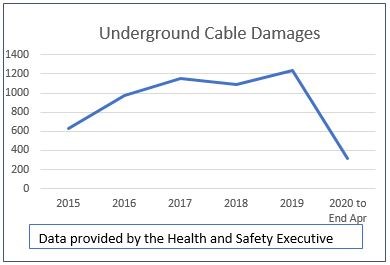As lockdown eases and construction work begins again, Britain’s energy network companies are urging construction workers returning to work to stay safe by making sure that they are aware of any potential underground cables or gas pipes before they carry out any work that involves breaking ground.
This also includes working out how they are going to locate utility equipment to avoid the risk of damaging it and risking their safety.
During the coronavirus pandemic, construction work and projects across the UK have experienced a period of downtime, in particular, that work which involves excavation.
As a result, energy network companies have experienced a welcome reduction in third-party damages to underground cables, gas pipelines and other equipment. In reality, this also means a reduction in the risk of harm to those involved in the damage.
As lockdown restrictions begin to ease across the UK and work levels increase, it’s essential that excavation teams remember the basic safety precautions necessary to ensure they stay safe.
Energy Networks Association has advice for construction workers to help them work safely:
- Be aware of the location of underground utility equipment before digging or excavating.
- Request location details and plans from utility companies well in advance of work starting. Remember that these are a guide only – you are responsible for confirming the exact location of all equipment and avoiding damage.
- Use a cable avoidance tool to identify the presence of buried cables before you start to dig. Rescan the area as your work progresses. Hand Dig — use safe digging techniques to dig trial holes to establish the line and depth of underground utility equipment.
- Always assume underground cables are Live. If they appear to be damaged do not approach them and contact the Network Operator using 105 for GB (or 03457 643 643 in Northern Ireland). Take care when lowering the ground levels as there may be underground cables in the area.
- If you damage an underground cable, vacate the excavation immediately, phone your electricity network operator’s emergency number and keep everybody clear.
David Smith, Chief Executive of Energy Networks Association, said:
“The energy network includes thousands of miles of underground gas pipes and power cables which is why it’s so important for construction workers returning to work to stay safe and to know what utilities are underground before they break ground.
“This is a very serious safety message and I urge everyone who may be carrying out work that requires excavation to plan their work safely and help us to keep Britain’s energy flowing.”
Notes to editor
- Full 'Watch out, cables about' briefing
- Energy Networks Association’s leaflet “Watch out, cables about”
- In an emergency dial 999 and tell them electricity is involved. Call 105 for GB (or 03457 643 643 in Northern Ireland) if there is a safety concern related to the electricity network or if you spot damage to overhead power lines, underground cables and substations that could put you, or someone else, in danger.
- If there is doubt about whether an underground cable or other piece of equipment is safe, always assume it is live, keep away from it and contact your local electricity network operator.
- Follow the advice in Health and Safety Executive (HSE) Guidance HSG47 ‘Avoiding danger from underground services’ and ENA’s ‘Watch Out, Cables About’ Safety advice leaflet. Complete your risk assessment before starting work and share the details of this with everyone involved in the work.
- Further guidance and advice is available via the Utility Strike Avoidance web site: https://www.utilitystrikeavoidancegroup.org
About Energy Networks Association
Energy Networks Association (ENA) is the industry body representing the electricity wires, gas pipes and energy system in the UK and Ireland.
ENA helps its members meet the challenge of delivering electricity and gas to communities across the UK and Ireland safely, sustainably and reliably.
Its members include every major electricity and gas network operator in the UK and Ireland, independent operators, National Grid ESO which operates the electricity system in Great Britain and National Gas which operates the gas system in Great Britain. Its affiliate membership also includes companies with an interest in energy, including Heathrow Airport and Network Rail.
What are energy network operators?
Energy network operators manage and maintain the wires, pipes and other infrastructure which delivers electricity and gas to your home, business and community. They are private companies which are regulated by Ofgem and employ around 40,000 people in Great Britain.





